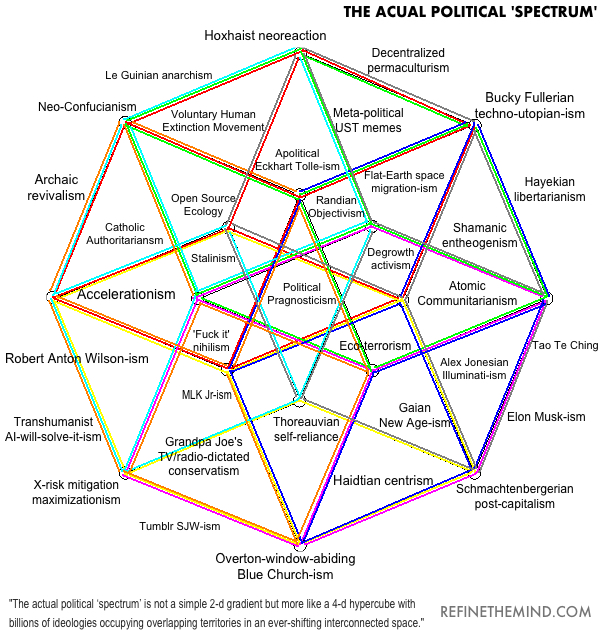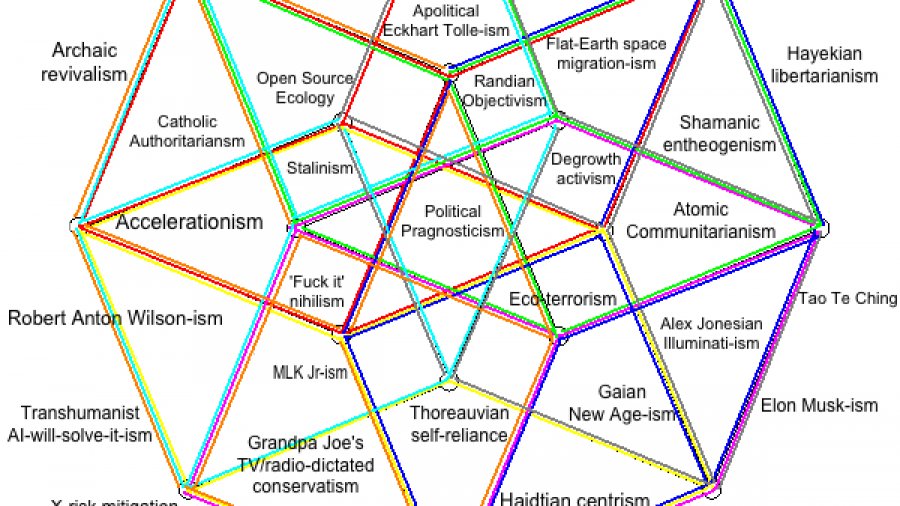Pragmatism + Agnosticism = Pragnosticism: A non-dogmatic approach to politics and life.
1/ Forget left and right political discourse.
2/ View global (political) issues as engineering/design problems for which we simply need to discover the most effective solutions.
3/ Ideas should be judged by their usefulness, not by their coordinates within an abstracted system of left-vs-right categorization.
4/ The actual political ‘spectrum’ is not a simple 2-d gradient but more like a 4-d hypercube with billions of ideologies occupying overlapping territories in an ever-shifting interconnected space.

5/ Good ideas can emerge from any locus within this vast dance.
6/ I consider myself a politically agnostic pragmatist (politically pragnostic) because I’m interested in finding the good ideas that actually work, rather than confining myself to one minuscule territory within this vast hypercube and vigorously waving my particular team’s flag.
7/ To be politically agnostic is to acknowledge that one does not know the final answer to the questions, “What is the Best Political System?” and “What is the Best Economic System?”—and that perhaps there is no single or final answer. To assume that one knows the answers to these questions is to repeat a tragic misstep that has plagued human history; people who become dogmatic about the Ultimate Rightness of their pet system often end up killing thousands or millions of people while trying to implement said system.
8/ The question of the ideal political or economic system is a question of mind-boggling complexity, and no one truly knows the answer. Thus, in my view, political agnosticism is the most sensible position to take on these questions. Instead of making ideological assertions about the Best System or Best Policy based on abstract argumentation, we should test ideas in the real world on small scales, then scale up the ones that work well. This is what we do with other forms of technology—why don’t we do the same with our technologies of collective choice-making (governance) and incentivizing + resource-allocation (economics)? This approach is pragmatic because it prioritizes what works over all else.
9/ As we gain data about what works, we can continuously update our Bayesian priors —i.e. adjust our sense of the likelihood that various approaches will produce desired outcomes; refine our models of how to optimally design human civilization.
“When my information changes, I alter my conclusions. What do you do, sir?”
— John Maynard Keynes
10/ We need civilizational test tubes (of a kind similar to those proposed by The Venus Project) on a small scale in which we can test new forms of governance, economy, technology, and culture. Seasteads, communes, Mars colonies, and new (refugee) eco-cities could all be fertile grounds for implementing and experimenting with quasi-utopian ideas/technologies to see what works well.

(Featured image) source: Codex Seraphinianus by Luigi Serafini
11/ Most of us want similar things: A prosperous, peaceful, wise, sustainable world for ourselves, our children, our grandchildren, other sentient beings, etc, in which violence is minimized, freedom is maximized, nobody starves or dies of poverty, and there are bountiful opportunities to flourish. Unfortunately, this truth is emphatically suppressed by narrow-minded polarizers who miss the forest for the trees.
12/ Political pragnosticism suggests that we ought to direct a laser focus toward our common, near-universal aims and take an empirical approach to attaining them, rather than getting caught up in endless squabbling about inevitable differing nuances of opinion or hyper-niche issues.
13/ Political pragnosticism suggests that the overriding, top priority of our politics must be the long-term flourishing/preservation of our species and the biosphere, and thus the mitigation of extinction-level risks. Reasoning: If we go extinct, no other causes matter. Hypothesis: If a given political approach did nothing other than optimize for extinction-level risk mitigation, it would already be superior to ~99% of approaches.
14/ Political pragnosticism is open to all effective solutions and welcomes those that come from non-political domains, recognizing that circumventing politics altogether is often the best answer. Things like effective altruism/philanthropy, Elon-Muskian market activism/social entrepreneurship, libertarian-ish efforts to decentralize power (e.g. blockchain tech), consciousness-/wisdom-/intelligence-expanding initiatives, therapists/healers, artists/psychonauts/sages, inventors/innovators/futurists, pragmatic/non-dogmatic activists of all stripes, grounded/prudent transhumanists/AI scientists, open-source/crowd-sourced projects, archaic revivalists, permaculturists/self-reliance gurus, etc. are seen as promising potential allies in the quest to design/actualize an omni-considerate/omni-win-win human civilization.
15/ The point is to enthusiastically test all viable strategies for civilization-optimization and gradually synthesize an increasingly wise/effective multi-disciplinary/multi-domain approach. Start small, scale up what works.
16/ In other contexts (life, business, etc.), political pragnosticism may be simplified to pragnosticism: One admits that one does not know the best way to live life or do X or Y, so one explores/tests a wide array of promising hypotheses, in order to continually refine a better approach. This can be seen as akin to a ‘scientific method’ of living or doing anything: Hypothesize. Experiment. Gather data. Learn. Iterate.
17/ Pragnosticism is a robust philosophy, potentially useful in many contexts. It has been an indispensable module in my general approach to life for several years. A key point is that, as in science, one never arrives at final conclusions, just ever-more-refined models. In this way, there is always room for more learning, updating, epiphanies, breakthroughs, wisdom.
18/ Let’s return to where we began: In light of this broader frame of (political) pragnosticism, the ongoing feud of dogmatic left VS dogmatic right—and the media shit-circus surrounding it—is unmasked as a misleading, distracting, hyper-simplistic, vitriolic, polarizing game that obfuscates the most fundamental issues of our time and obstructs real progress.
———
Notes:
- All glory due to my beloved friend Jon Brooks for coining the term “pragnosticism” shortly after I began explaining “agnostic pragmatism” to him.
- The “gnosticism” in “pragnosticism,” if you’re so inclined, can additionally signify that one’s approach to life/politics/problem-solving/etc. is informed by mystical experiences. This is true for me.
This post originated as a tweet-storm of mine.
About Jordan Bates
Jordan Bates is a Lover of God, healer, mentor of leaders, writer, and music maker. The best way to keep up with his work is to join nearly 7,000 people who read his Substack newsletter.





